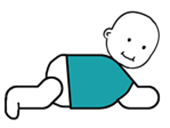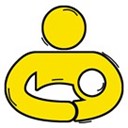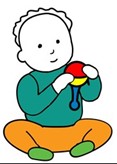If your baby needed extra care after they were born it is natural to wonder if this will affect how they grow and develop. It will depend very much on the reason your baby needed to stay in the neonatal unit. Some babies may recover straight away from their early problems and some may have conditions that mean their growth and development is affected for longer.
If your baby is born early (before 37 weeks gestation) it can take up to two years for them to catch up with other children their age. It might be sooner or later than this depending on your child and the challenges they face.
All babies are different and so it is important to try and focus on helping your child reach their potential in their own time.
Your baby will probably have been weighed very regularly whilst on the unit. This allows the team to make sure your baby is getting the nutrition they need to recover and allows them to calculate the drug dosages they need.
Some babies might need to be weighed on a regular basis after you leave hospital. The neonatal team will advise how often your baby needs to be weighed.
Read the NHS guidance on how often healthy babies are weighed
Positioning
When babies are born early or are poorly after their birth they are cared for in an environment that is very different from the womb! It is often bright and noisy. They are not able to be in the curled up fetal position of the womb.
 Staff on the unit do all they can to make up for this, by having quiet times and trying to keep noise levels as low as possible. Your baby’s position will be adjusted to be as close to a fetal position as their condition allows.
Staff on the unit do all they can to make up for this, by having quiet times and trying to keep noise levels as low as possible. Your baby’s position will be adjusted to be as close to a fetal position as their condition allows.
By the time your baby goes home you should follow the advice for all babies that they sleep on their backs on a flat, firm mattress. This is the safest way for your baby to sleep to keep the risk of sudden infant death (SIDs) low.
Head Shape
Some parents worry about their babies head shape. This nearly always resolves its self by the time they are one or two years old, or becomes unnoticeable once they have more hair.
Babies can get a ‘favourite’ side to look towards. Because their skulls are still soft, this can affect the shape of their head. You can help with this by;
If you are worried speak to your GP or call Just One Number to speak to a health professional.
Feeding Your Baby
 Your baby may still need feeding support after discharge. They may still be having some feeds by nasogastric tube and / or need special milks or supplements. The team on the neonatal unit will make sure you understand what extra support your baby needs and help you feel confident before you head home.
Your baby may still need feeding support after discharge. They may still be having some feeds by nasogastric tube and / or need special milks or supplements. The team on the neonatal unit will make sure you understand what extra support your baby needs and help you feel confident before you head home.
The unit will let you know about any vitamins and supplements your baby needs, make sure you have some to take home and know how to order any repeat prescriptions.
Read more about infant feeding
Weaning
As time passes you may start wondering when to introduce solid foods. Most health professionals agree that babies who are born early can show signs they are ready to start trying solid foods at about 5-6 months corrected age. However, all babies are different.
If your baby is still having follow up visits at the hospital you can discuss weaning at your appointment. You can call Just One Norfolk to talk about introducing solids with a health professional.
Find out more about deciding if your premature baby is ready to try solid foods
Supporting Development
 All babies are different. Try not to compare your baby with your other children, or other babies you know. Reaching developmental milestones may take a little longer for premature babies, in comparison with babies born at full term.
All babies are different. Try not to compare your baby with your other children, or other babies you know. Reaching developmental milestones may take a little longer for premature babies, in comparison with babies born at full term.
You have an important role to play as your babies first teacher and this will help them reach their potential in their own time. We have lots of information and tips to help you.
Immunisations
Immunisations are an important part of protecting babies and children from serious illnesses.
Even if your baby is born early or has health problems, it is still recommended that most babies have their immunisations at their actual age and not their corrected age. This is because the protection from illnesses that babies get from their mum’s whilst in the womb starts to decrease after the first two months of life.
The team caring for your baby will be able to give reassurance and advice about this.
Read more about the recommended immunisation schedule for babies
You can contact the Healthy Child Programme by calling Just One Number on 0300 300 0123 or texting Parentline on 07520 631590. Our opening hours are 8am-6pm Monday-Friday (excluding bank holidays) and 9am-1pm on Saturdays.
The Hamlet Centre provides nurture groups for babies and families who have spent time on the Neonatal Unit. They cover a range of topics that will be useful to you like weaning and baby massage as well as giving you the chance to talk with other families who have had a similar experience to you. The service is available to families living in Norfolk and Waveney.
'All Things NICU Norfolk' Facebook group - A support group for anyone connected to NICU, including parents and professionals. The group shares information about development and promotes local groups and fundraising.
Early Childhood and Family Service supports all Norfolk families with children under 5 years.
To speak to other Norfolk parents and carers, you can join our online community forum below.